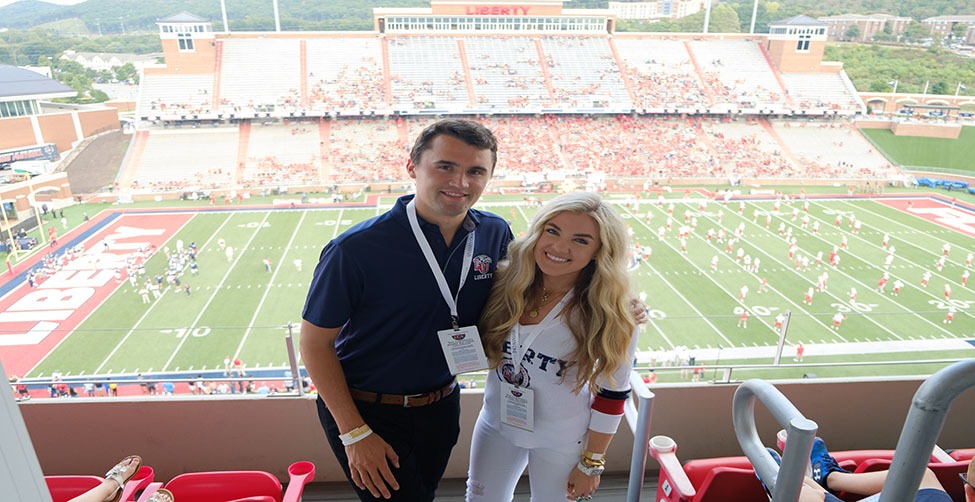Before the Class of 2019 turned its tassels and dispersed from Liberty Mountain one final time, Charlie Kirk implored the crowd to ponder the question: who is Jesus Christ?
“The answer to that question will come at a great price,” Kirk said from the podium. “Yet the reward is even greater.”
Erika Frantzve, who would marry Kirk just two years later, sat among the red-and-blue-clad graduates in Williams Stadium with her Juris Master of American Legal Studies. The evening prior, Kirk received his honorary doctorate at the baccalaureate ceremony.
During his brief remarks, Kirk brought to mind the Sermon on the Mount, referencing heavenly rewards and inevitable persecution of followers of Jesus.
He also came to campus earlier that year with an approach many friends knew him best for: to exchange ideas.
Shaking the hands of the university’s executive leadership, he walked into the president’s board room to discuss his primitive vision for what would become the Falkirk Center, known today as the Standing for Freedom Center (SFFC).
In about six months, the conservative think tank came to fruition and has since equipped students to use apologetics and theological reasoning to usher faith into the public square.
“Charlie was a voracious reader (and) learner who was a quick study,” said Vice President of Communications and Public Engagement Ryan Helfenbein. “He proved that with drive you could do this … you have to obsess over it, and you have to be disciplined.”
Helfenbein first met Kirk in the green room at the Conservative Political Action Conference (CPAC) satellite event at Liberty in March 2019.
While his talent and focus were apparent, something Helfenbein did not realize at the time was that he would gain a true friend that day. Their work surrounding politics never wavered from a foundation of faith as they exchanged Bible verses and prayed for one another.
In the years following, Kirk’s visits to campus were frequent — sometimes multiple in a single semester. From speaking in the Vines Center and walking alongside students at the March for Life to “proving the haters wrong” by throwing a 50-yard pass in an empty Williams Stadium, he could always find a home away from home at Liberty.
When “disagreers” debated Kirk at other college campuses, his points were not only formed by studying those he admired like Rush Limbaugh or Thomas Sowell, but also from listening intently to those around him. He challenged his own beliefs through inquiry — an approach that founded his organization Turning Point USA (TPUSA).
On occasion, Helfenbein even noticed tidbits of these interactions winding up in Kirk’s speaking engagements. Although these conversations usually dabbled in complex theological matters, they never strayed from the simplistic heart of conversation.
“Charlie would ask me questions that I obviously knew he had an opinion about or he already had an answer for,” Helfenbein said. “A lot of times when he’d ask me, he wanted to see ‘well, how would Ryan answer that? What would he say to that?’”
Kirk’s life’s work aimed to bridge hostile gaps by rationalizing beliefs through civil debate. Alumna Michele De Groote, having grown up in TPUSA, saw this work come to fruition as the gatherings grew from hundreds to thousands.
“His number one goal wasn’t to get you to agree with him on every political position,” De Groote said. “He wanted you to know Christ. He wanted you to know that you’re searching for liberty, you’re searching for freedom. God wrote that. God created that.”
The Kirks encouraged De Groote to visit Liberty on her college search, prompting her to move across the country to attain a Bachelor of Business Economics and a Master of Family Advocacy and Public Policy.
“(Charlie) wanted everyone working at Turning Point to feel appreciated and to feel like he really loves them,” TPUSA at LU president Kennedy Whetzel said. “Even just meeting him a few times, I could feel the love.”
The humility that Kirk led with can be traced back to the era of his ill-fitted suits, when he would converse with each conference attendee in the hotel lobby during TPUSA’s early years.
From their first meeting in 2016, Jaco Booyens saw how his friend’s God-given gifts were honed through maturity.
“From the first time I met him, the kid back then was fighting for a country, fighting for ideals,” Booyens said. “I met this guy sitting on a stool in a tent, and he never lost his humility. He finished sitting on a stool in a tent.”
As Kirk grew through sanctification, Booyens witnessed a change when he stepped into his role as a devoted husband and father of two. His private commitment to faith and family directly impacted his public boldness.
“I think in these moments, I’m reminded of Charlie’s courage to obey the Lord and do the hard things,” Helfenbein said. “That’s what we need to be committed to do. It cost him his life. His mission field was the American university.”
Kirk’s untimely death was not only a catalyst to spread the gospel, but it also now serves as a reminder that true revival is not marked by an emotional impulse, but by sustained courage and boldness driven by the Holy Spirit.
Hagen is the feature editor.
